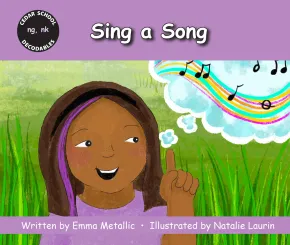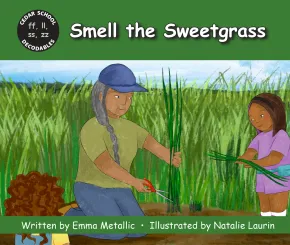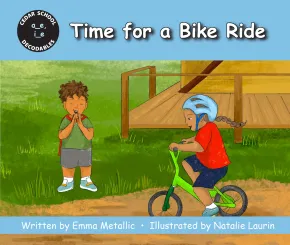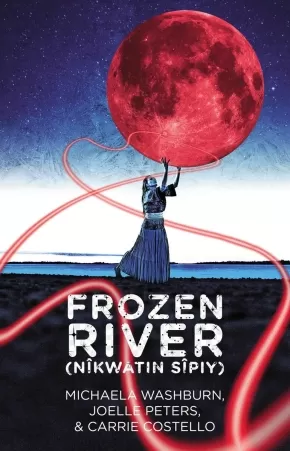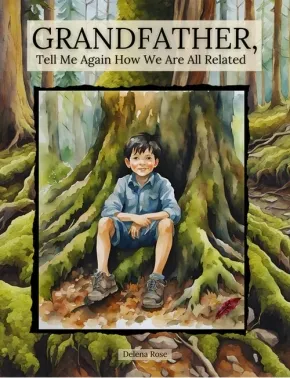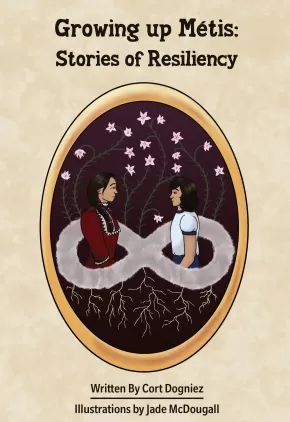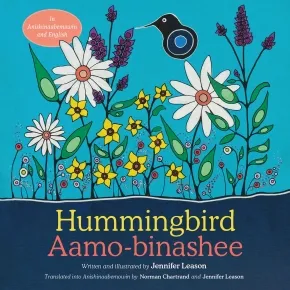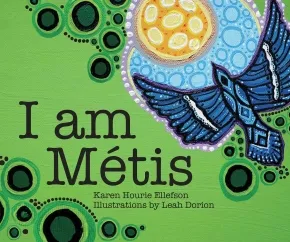
Métis
46
-
60
of
225 Results;
Sort By
Go To
of 15
Cedar School Decodables: Sap!
 $7.99
$7.99

Artists:
Format:
Paperback
Text Content Territories:
Indigenous Canadian; First Nations; Mi'kmaq (Mi'gmaq); Listuguj Mi'gmaq First Nation;
Grade Levels: Kindergarten; 1;
ISBN / Barcode: 9781771746359
Synopsis:
Synopsis:
In this story, Tom and Liv learn how to collect sap from maple trees. Back at school, Miss Sam heats the sap, and it turns into maple syrup!
Mi’gmaq use maple syrup to sweeten their foods and as medicine.
Have you ever tasted maple syrup?
Educator Information
Recommended for ages 4-7, for use in kindergarten and Grade 1 classrooms.
Cedar School Decodables is divided into six sets, which increase in word count and complexity of sentence structure. Sap! is in Set 1 – Short Vowels, and reviews short a and nasalized a. Books in Set 1 have 40-60 words.
Readers should be familiar with the concepts included in Set 1:
- consonants
- beginning and end blends
- short vowels
- s – /s/ and /z/
- -s suffix
Series Information
Welcome to Cedar School! Join Liv, Tom, Gus, and Bell as they learn on the land and explore Mi’gmaw teachings with their teacher, Miss Sam, and the school’s Mi’gmaw Elder, Jen. With charming illustrations and simple storylines, this decodable series engages students as they practise their reading skills. Each book includes a pre-reading review of non-decodable words, and many of the books introduce special words related to Indigenous teachings. Talking Together prompts facilitate discussions led by the reading teacher.
Developed in partnership with Dyslexia Canada, Cedar School Decodables is a series of 20 decodable books for young readers. Designed for students who have previously learned short vowel and consonant sounds, additional phonic skills are developed progressively throughout the series.
The series will be accompanied by Cedar School Decodables Teacher’s Guide and a series of four picture books, which will be available at a later date.
Additional Information
16 pages | 6.5” x 5.5” | Paperback | ISBN: 9781771746359
Cedar School Decodables: Sing a Song
 $7.99
$7.99

Artists:
Format:
Paperback
Text Content Territories:
Indigenous Canadian; First Nations; Mi'kmaq (Mi'gmaq); Listuguj Mi'gmaq First Nation;
Grade Levels: Kindergarten; 1;
ISBN / Barcode: 9781771746434
Synopsis:
Synopsis:
In this story, Bell and Jen work in the school garden. Bell sings a song to help the plants grow.
It is a Mi’gmaw custom to honour the sun. The sun provides heat and light, which nourish life on Earth. Mi’gmaq honour the sun with songs and ceremonies.
How can you help plants grow?
Educator Information
Recommended for ages 4-7, for use in kindergarten and Grade 1 classrooms.
Cedar School Decodables is divided into six sets, which increase in word count and complexity of sentence structure. Sing a Song is in Set 2 – Digraphs, and reviews ng and nk. Books in Set 2 have 60-80 words.
Readers should be familiar with the concepts included in Set 1 and Set 2:
- consonants
- beginning and end blends
- short vowels
- digraphs
- a /o/
- s – /s/ and /z/
- -s suffix
Series Information
Welcome to Cedar School! Join Liv, Tom, Gus, and Bell as they learn on the land and explore Mi’gmaw teachings with their teacher, Miss Sam, and the school’s Mi’gmaw Elder, Jen. With charming illustrations and simple storylines, this decodable series engages students as they practise their reading skills. Each book includes a pre-reading review of non-decodable words, and many of the books introduce special words related to Indigenous teachings. Talking Together prompts facilitate discussions led by the reading teacher.
Developed in partnership with Dyslexia Canada, Cedar School Decodables is a series of 20 decodable books for young readers. Designed for students who have previously learned short vowel and consonant sounds, additional phonic skills are developed progressively throughout the series.
The series will be accompanied by Cedar School Decodables Teacher’s Guide and a series of four picture books, which will be available at a later date.
Additional Information
16 pages | 6.5” x 5.5” | Paperback | ISBN: 9781771746434
Cedar School Decodables: Smell the Sweetgrass
 $7.99
$7.99

Artists:
Format:
Paperback
Text Content Territories:
Indigenous Canadian; First Nations; Mi'kmaq (Mi'gmaq); Listuguj Mi'gmaq First Nation;
Grade Levels: Kindergarten; 1;
ISBN / Barcode: 9781771746403
Synopsis:
Synopsis:
In this story, Jen takes the class on an adventure to harvest sweetgrass.
Sweetgrass is a traditional medicine plant for Mi’gmaq. The grass can be braided and given to friends and family. Mi’gmaq give thanks to the land before a harvest.
How can you give thanks to the land?
Educator Information
Recommended for ages 4-7, for use in kindergarten and Grade 1 classrooms.
Cedar School Decodables is divided into six sets, which increase in word count and complexity of sentence structure. Smell the Sweetgrass is in Set 2 – Digraphs, and reviews the FLSZ spelling rule (ff, ll, ss, zz). Books in Set 2 have 60-80 words.
Readers should be familiar with the concepts included in Set 1 and Set 2:
- consonants
- beginning and end blends
- short vowels
- digraphs
- a /o/
- s – /s/ and /z/
- -s suffix
Series Information
Welcome to Cedar School! Join Liv, Tom, Gus, and Bell as they learn on the land and explore Mi’gmaw teachings with their teacher, Miss Sam, and the school’s Mi’gmaw Elder, Jen. With charming illustrations and simple storylines, this decodable series engages students as they practise their reading skills. Each book includes a pre-reading review of non-decodable words, and many of the books introduce special words related to Indigenous teachings. Talking Together prompts facilitate discussions led by the reading teacher.
Developed in partnership with Dyslexia Canada, Cedar School Decodables is a series of 20 decodable books for young readers. Designed for students who have previously learned short vowel and consonant sounds, additional phonic skills are developed progressively throughout the series.
The series will be accompanied by Cedar School Decodables Teacher’s Guide and a series of four picture books, which will be available at a later date.
Additional Information
16 pages | 6.5” x 5.5” | Paperback | ISBN: 9781771746403
Cedar School Decodables: The Star World
 $7.99
$7.99

Artists:
Format:
Paperback
Text Content Territories:
Indigenous Canadian; First Nations; Mi'kmaq (Mi'gmaq); Listuguj Mi'gmaq First Nation;
Grade Levels: Kindergarten; 1;
ISBN / Barcode: 9781771746533
Synopsis:
Synopsis:
In this story, Jen shares a Mi’gmaw Creation Story. It explains how Mi’gmaq grew from the earth.
Mi’gmaq pass down knowledge and teachings through storytelling. Some stories are written with pictures instead of words. These pictures are called hieroglyphs.
Can you find the hieroglyph that means “lightning” in the book?
Educator Information
Recommended for ages 4-7, for use in kindergarten and Grade 1 classrooms.
Cedar School Decodables is divided into six sets, which increase in word count and complexity of sentence structure. The Star World is in Set 6 – R-Controlled Vowels, and reviews ar, or, and ore. Books in Set 6 have 110-125 words.
Readers should be familiar with the concepts included in Set 1 to Set 6:
- consonants
- beginning and end blends
- short, long, and r-controlled vowels
- digraphs
- suffixes and ending spelling patterns
- a /o/
- s – /s/ and /z/
- VC-CV, V/CV, VC/V, and compound words
- possessives
Series Information
Welcome to Cedar School! Join Liv, Tom, Gus, and Bell as they learn on the land and explore Mi’gmaw teachings with their teacher, Miss Sam, and the school’s Mi’gmaw Elder, Jen. With charming illustrations and simple storylines, this decodable series engages students as they practise their reading skills. Each book includes a pre-reading review of non-decodable words, and many of the books introduce special words related to Indigenous teachings. Talking Together prompts facilitate discussions led by the reading teacher.
Developed in partnership with Dyslexia Canada, Cedar School Decodables is a series of 20 decodable books for young readers. Designed for students who have previously learned short vowel and consonant sounds, additional phonic skills are developed progressively throughout the series.
The series will be accompanied by Cedar School Decodables Teacher’s Guide and a series of four picture books, which will be available at a later date.
Additional Information
16 pages | 6.5” x 5.5” | Paperback | ISBN: 9781771746533
Cedar School Decodables: Time for a Bike Ride
 $7.99
$7.99

Artists:
Format:
Paperback
Text Content Territories:
Indigenous Canadian; First Nations; Mi'kmaq (Mi'gmaq); Listuguj Mi'gmaq First Nation;
Grade Levels: Kindergarten; 1;
ISBN / Barcode: 9781771746441
Synopsis:
Synopsis:
In this story, Tom shares his bicycle with Gus, but Gus is nervous about riding it. Will he be brave?
Community is important to Mi’gmaq, which is why Mi’gmaq care for and look after each other. One of the ways they do this is by being a good friend.
Can you think of a time when a friend helped you?
Educator Information
Recommended for ages 4-7, for use in kindergarten and Grade 1 classrooms.
Cedar School Decodables is divided into six sets, which increase in word count and complexity of sentence structure. Time for a Bike Ride is in Set 3 – VCe, and reviews a_e and i_e. Books in Set 3 have 80-90 words.
Readers should be familiar with the concepts included in Set 1 to Set 3:
- consonants
- beginning and end blends
- short and long vowels
- digraphs
- a /o/
- s – /s/ and /z/
- -s and -es suffixes
- possessives
Series Information
Welcome to Cedar School! Join Liv, Tom, Gus, and Bell as they learn on the land and explore Mi’gmaw teachings with their teacher, Miss Sam, and the school’s Mi’gmaw Elder, Jen. With charming illustrations and simple storylines, this decodable series engages students as they practise their reading skills. Each book includes a pre-reading review of non-decodable words, and many of the books introduce special words related to Indigenous teachings. Talking Together prompts facilitate discussions led by the reading teacher.
Developed in partnership with Dyslexia Canada, Cedar School Decodables is a series of 20 decodable books for young readers. Designed for students who have previously learned short vowel and consonant sounds, additional phonic skills are developed progressively throughout the series.
The series will be accompanied by Cedar School Decodables Teacher’s Guide and a series of four picture books, which will be available at a later date.
Additional Information
16 pages | 6.5” x 5.5” | Paperback | ISBN: 9781771746441
Cedar School Decodables: We Smudge
 $7.99
$7.99

Artists:
Format:
Paperback
Text Content Territories:
Indigenous Canadian; First Nations; Mi'kmaq (Mi'gmaq); Listuguj Mi'gmaq First Nation;
Grade Levels: Kindergarten; 1;
ISBN / Barcode: 9781771746502
Synopsis:
Synopsis:
In this story, Gus and Tom are upset. Miss Sam helps them smudge to feel better.
Mi’gmaq burn sage and other traditional medicines to smudge. Smudging helps people let go of sadness and anger.
What do you do when you are feeling sad?
Educator Information
Recommended for ages 4-7, for use in kindergarten and Grade 1 classrooms.
Cedar School Decodables is divided into six sets, which increase in word count and complexity of sentence structure. We Smudge is in Set 5 – Ending Spelling Patterns, and reviews -tch and -dge. Books in Set 5 have 100-110 words.
Readers should be familiar with the concepts included in Set 1 to Set 5:
- consonants
- beginning and end blends
- short and long vowels
- digraphs
- suffixes and ending spelling patterns
- a /o/
- s – /s/ and /z/
- VC-CV, V/CV, VC/V, and compound words
Series Information
Welcome to Cedar School! Join Liv, Tom, Gus, and Bell as they learn on the land and explore Mi’gmaw teachings with their teacher, Miss Sam, and the school’s Mi’gmaw Elder, Jen. With charming illustrations and simple storylines, this decodable series engages students as they practise their reading skills. Each book includes a pre-reading review of non-decodable words, and many of the books introduce special words related to Indigenous teachings. Talking Together prompts facilitate discussions led by the reading teacher.
Developed in partnership with Dyslexia Canada, Cedar School Decodables is a series of 20 decodable books for young readers. Designed for students who have previously learned short vowel and consonant sounds, additional phonic skills are developed progressively throughout the series.
The series will be accompanied by Cedar School Decodables Teacher’s Guide and a series of four picture books, which will be available at a later date.
Additional Information
16 pages | 6.5” x 5.5” | Paperback | ISBN: 9781771746502
Cedar School Decodables: What Track Is This?
$7.99
Artists:
Format:
Paperback
Text Content Territories:
Indigenous Canadian; First Nations; Mi'kmaq (Mi'gmaq); Listuguj Mi'gmaq First Nation;
Grade Levels: Kindergarten; 1;
ISBN / Barcode: 9781771746410
Synopsis:
Synopsis:
In this story, Miss Sam and the class are exploring the forest when they see an animal track on Cub Path! What animal made it?
Mi’gmaq use tracks to find animals in the forest. Mi’gmaq live in balance with the land and honour the animals that live on it.
Have you ever seen an animal track?
Educator Information
Recommended for ages 4-7, for use in kindergarten and Grade 1 classrooms.
Cedar School Decodables is divided into six sets, which increase in word count and complexity of sentence structure. What Track Is This? is in Set 2 – Digraphs, and reviews ck, sh, and th (voiced and unvoiced). Books in Set 2 have 60-80 words.
Readers should be familiar with the concepts included in Set 1 and Set 2:
- consonants
- beginning and end blends
- short vowels
- digraphs
- a /o/
- s – /s/ and /z/
- -s suffix
Series Information
Welcome to Cedar School! Join Liv, Tom, Gus, and Bell as they learn on the land and explore Mi’gmaw teachings with their teacher, Miss Sam, and the school’s Mi’gmaw Elder, Jen. With charming illustrations and simple storylines, this decodable series engages students as they practise their reading skills. Each book includes a pre-reading review of non-decodable words, and many of the books introduce special words related to Indigenous teachings. Talking Together prompts facilitate discussions led by the reading teacher.
Developed in partnership with Dyslexia Canada, Cedar School Decodables is a series of 20 decodable books for young readers. Designed for students who have previously learned short vowel and consonant sounds, additional phonic skills are developed progressively throughout the series.
The series will be accompanied by Cedar School Decodables Teacher’s Guide and a series of four picture books, which will be available at a later date.
Additional Information
16 pages | 6.5” x 5.5” | Paperback | ISBN: 9781771746410
Cedar School Decodables: Wild Strawberries
 $7.99
$7.99

Artists:
Format:
Paperback
Text Content Territories:
Indigenous Canadian; First Nations; Mi'kmaq (Mi'gmaq); Listuguj Mi'gmaq First Nation;
Grade Levels: Kindergarten; 1;
ISBN / Barcode: 9781771746519
Synopsis:
Synopsis:
In this story, Jen and the class pick wild strawberries. Back at school, Jen makes strawberry jam.
Wild strawberries grow throughout Mi’gmaw territory. Mi’gmaq harvest berries and other plants for food and medicine.
Have you ever gone berry picking?
Educator Information
Recommended for ages 4-7, for use in kindergarten and Grade 1 classrooms.
Cedar School Decodables is divided into six sets, which increase in word count and complexity of sentence structure. Wild Strawberries is in Set 5 – Ending Spelling Patterns, and reviews -ild, -old, -ind, -olt, and -ost. Books in Set 5 have 100-110 words.
Readers should be familiar with the concepts included in Set 1 to Set 5:
- consonants
- beginning and end blends
- short and long vowels
- digraphs
- suffixes and ending spelling patterns
- a /o/
- s – /s/ and /z/
- VC-CV, V/CV, VC/V, and compound words
Series Information
Welcome to Cedar School! Join Liv, Tom, Gus, and Bell as they learn on the land and explore Mi’gmaw teachings with their teacher, Miss Sam, and the school’s Mi’gmaw Elder, Jen. With charming illustrations and simple storylines, this decodable series engages students as they practise their reading skills. Each book includes a pre-reading review of non-decodable words, and many of the books introduce special words related to Indigenous teachings. Talking Together prompts facilitate discussions led by the reading teacher.
Developed in partnership with Dyslexia Canada, Cedar School Decodables is a series of 20 decodable books for young readers. Designed for students who have previously learned short vowel and consonant sounds, additional phonic skills are developed progressively throughout the series.
The series will be accompanied by Cedar School Decodables Teacher’s Guide and a series of four picture books, which will be available at a later date.
Additional Information
16 pages | 6.5” x 5.5” | Paperback | ISBN: 9781771746519
Discovering and Understanding The Métis
$24.99
Format:
Hardcover
Text Content Territories:
Indigenous Canadian; Métis;
ISBN / Barcode: 9782898244766
Synopsis:
Synopsis:
From their origins to their lives today, the Métis have so many things to tell us! Thanks to beautiful photos, illustrations, and texts written by experts, we can learn and understand more about the rich culture of the Métis.
Educator & Series Information
Recommended for ages 7 to 12.
This book is part of the Discovering and Understanding series.
Additional Information
32 pages | 8.66" x 10.62" | Hardcover
Fish Farts: And Other Amazing Ways Animals Adapt
$23.99
Artists:
Format:
Hardcover
ISBN / Barcode: 9781665918831
Synopsis:
Synopsis:
From popping off a tail to rolling around in dung to farting to send a message, this funny and informative nonfiction picture book shows the many unusual ways animals adapt to their surroundings!
Animals survive and thrive in astounding ways: they trick, trap, and fry predators; feed on other animals’ poop and skin; and use electric zaps, slime, and other unexpected methods to communicate.
Featuring animals like Komodo dragons, bombardier beetles, and capuchin monkeys, this fact-filled book explores the surprising, exciting, and sometimes hilarious ways that animals adapt.
Reviews
"Welcome to the wonderful world of animal slime, poop, gas, vomit, and gross parenting practices. . . . [Settel] shows a knack for slipping in facts as likely to intrigue as revolt . . . . Donovan tones down the gross in her brightly hued animal portraits enough to elicit more cooing than spewing. . . . A crowd-pleasing way to deliver some substantial (info) dumps."— Kirkus Reviews, 5/1/24
"Donovan's digital art is brightly colored and does a good job depicting important points from the text, such as a giraffe's blue tongue (which acts as a sunscreen) wrapped around a branch. The gross-out factor is prominent throughout. . . . Appended with a glossary, this should intrigue borrowers and lead to further investigation."— Booklist, 5/15/24
Educator Information
Recommended for ages 7 to 10.
Additional Information
48 pages | 10.00" x 8.00" | Hardcover
Frozen River (nîkwatin sîpiy)
$18.95
Format:
Paperback
Text Content Territories:
Indigenous Canadian; First Nations; Anishinaabeg; Ojibway; Cree (Nehiyawak); Métis;
ISBN / Barcode: 9780369104892
Synopsis:
Synopsis:
Exploring reconciliation and connection through a story that spans seven generations, Frozen River (nîkwatin sîpiy) tells the story of two eleven-year-olds through the eyes of Grandmother Moon. Eilidh and Wâpam are born under the same blood moon, but Eilidh was born in Scotland and Wâpam in Kihci-Manito kâ ayapit, now known as Manitoba. After sailing across the ocean in hopes of a more prosperous life, Eilidh meets Wâpam deep in the forest, and the two become instant friends. Coming from vastly different worlds, Eilidh and Wâpam decide to teach each other about their ways of life. But when a sacred promise between them is broken, the relationship among cultures becomes jeopardized for generations to come.
Frozen River (nîkwatin sîpiy) shows audiences that an openness to learn from those who have protected and honoured the waterways for centuries can lead to healing and reconciliation.
Awards
- 2021 Sharon Enkin Plays for Young People Award winner
Reviews
"The show’s script cleverly makes important issues digestible for young audiences."— Van City Vince
Educator Information
Recommended for ages 8 to 14.
Additional Information
88 pages | 5.37" x 8.38" | Paperback
Grandfather, Tell Me Again How We Are All Related
$17.95
Artists:
Format:
Paperback
Text Content Territories:
Indigenous Canadian;
ISBN / Barcode: 9781069189509
Synopsis:
Synopsis:
A grandfather teaches his grandson how we are all related to plants, insects, birds and animals—and that each of us has a place in the sacred web of life.
Educator Information
Recommended for ages 7 to 12.
Additional Information
38 Pages
Growing up Métis : Stories of Resiliency
$17.50
Artists:
Format:
Paperback
Text Content Territories:
Indigenous Canadian; Métis;
ISBN / Barcode: 978-1-988011-34-9
Synopsis:
Synopsis:
Cort Dogniez’s Growing up Métis: Stories of Resiliency is the second installment of his historical fiction series that began with Road to La Prairie Ronde. In two separate, but connected fictionalized stories, Cort delves into the lives of two of his foremothers: his great-grandmother, Josephine Gariepy and his grandmother, Clara Dumont when they were young. While highlighting the dispossession and marginalization of his ancestors following the 1885 Resistance, Cort deftly weaves Métis culture through these two stories with a positive “focus on nicknames, faith, storytelling, and a resilient spirit.”
Jade McDougall’s beautiful illustrations brings these poignant, coming of age stories to life. Growing up Métis: Stories of Resiliency includes Michif and Cree glossaries to reflect Josephine and Clara’s first languages as well as guide questions for educators to explore the stories and Métis culture in depth with their students.
Educator & Series Information
Recommended by the publisher for ages 9+.
This book is the second installment in the historical fiction series that began with Road to La Prairie Ronde.
Additional Information
85 Pages | 14 cm x 20.3 cm | Paperback
Hummingbird / Aamo-binashee
$21.95
Artists:
Format:
Hardcover
Text Content Territories:
Indigenous Canadian; First Nations; Anishinaabeg;
ISBN / Barcode: 9781459837140
Synopsis:
Synopsis:
You never walk alone.
Remember the hummingbird's teachings. Remember you are loved.
Kokum warned us to watch out for one another. If we weren't careful, Windigo would eat us. But one night, alone in the darkness, I felt its breath on my neck. Windigo's lies crept into my heart, and I believed them. When we lose connection with others, we lose ourselves, and Windigo's darkness grows and spreads.
In this deeply emotional and beautifully illustrated picture book, the ancestors send a hummingbird to a child lost in Windigo’s darkness. Its teachings of resilience, love and connection bring the child home and remind us that our ancestors are always watching and can help us find our way if we only ask.
This bilingual book includes full text in both English and Anishinaabemowin.
Educator Information
Recommended for ages 6 to 8.
Fountas & Pinnell Text Level Gradient: U
Lexile measure: 520L
Guided Reading Level: U
Dual-Language: English and Anishinaabemowin
There are many dialects fo Anishinaabemowin, and this book presents a phonetic spelling of the language as learned by the author and co-translator in Duck Bay, northeastern Manitoba. This dialect is sometimes referred to as Western Ojibwa, Nakawemowin, Saulteaux or Plains Ojibwa. Translated by Norman Chartrand and Jennifer Leason.
This beautifully illustrated story expresses hope, healing and reclamation of Indigenous strength and identity in the wake of oppression and trauma.
Additional Information
32 pages | 8.00" x 8.00" | Hardcover
I Am Metis
$23.95
Artists:
Format:
Hardcover
Text Content Territories:
Indigenous Canadian; Métis;
ISBN / Barcode: 9781554556212
Synopsis:
Synopsis:
"Who are you?", whispers the voice in the wind. "You are Métis." What does this strange word mean? A young girl watches her father to understand the unfamiliar label. Through a series of vignettes centred around her dad, the child interacts with her riverlot surroundings and delights in her Métis way of life.
Discover the joy and vibrancy of the Métis culture from a child's perspective. Feel the author's pride in her Métis identity, and her love for her father, as she relives childhood memories.
Educator Information
Recommended for ages 6 to 9.
Caution: The word "Indian" is used in this work when the author recounts a memory from her childhood.
Additional Information
32 pages | 10.00" x 8.00" | Hardcover
Sort By
Go To
of 15




